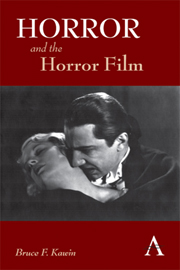2 - The Monster at the Bedroom Window
from Part I - Approaching the Genre
Summary
Tarantula
Tarantula concerns the experiments of Professor Gerald Deemer (Leo G. Carroll), who with his late assistants has been developing a radioactive nutrient that has led to rapid development and abnormal growth in animal test subjects, notably a gigantic tarantula that escapes during a fire in the lab in Deemer's house in the desert. The isotope they added to their nutrient, Deemer says late in the film, “triggered” the nutrient into “a nightmare.” There are indeed many scenes in Tarantula that can remind one of nightmares, such as when two men are running from the spider at night and can't get away, but one implication of Deemer's line is that the whole experience is comparable to a nightmare: that Tarantula's events are as frightening as those in a nightmare and could happen only in one (which lets the viewer compare the horror film to a nightmare) and that they have been overtaken by the equivalent of a frightening dream turned real, a horror that has erupted into the waking world with a monster that is, like the Monster in Bride of Frankenstein, “a nightmare in the daylight.” The use of the word “triggered” links the science fiction premise of the film to the 1950s' fear of uncontrolled atomic technology. This monster movie has aspects of both science fiction and horror, but horror predominates.
Stephanie “Steve” Clayton (Mara Corday), a graduate student, becomes Deemer's new assistant. One night she is studying in her second-story bedroom, wearing a robe.
- Type
- Chapter
- Information
- Horror and the Horror Film , pp. 20 - 31Publisher: Anthem PressPrint publication year: 2012

